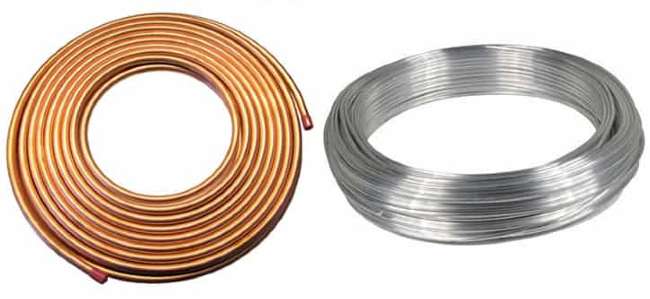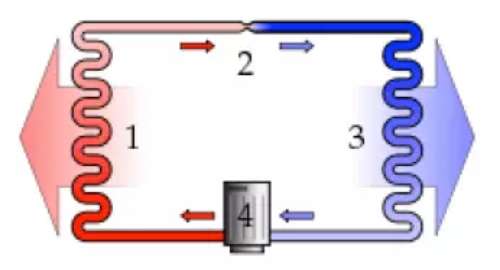Air conditioners are extremely helpful, especially during the scorching summer climates in India.
You can just turn on the AC and you’ll feel the cold air inside your room within minutes.
The condenser coils inside the AC play a very important role in its functioning, especially w.r.t cooling.

And, when it comes to condenser coils, Copper and Aluminum are most popular choice for AC coils in the recent times.
However, before deciding which condenser coil is better in AC, first let us understand the importance of both Copper and Aluminum coils in the air conditioning process.
Importance of Condenser Coils in an Air Conditioner
The AC refrigerant gas plays a vital role in an Air conditioner.
It transforms from gaseous state to liquid by compression technique and then reverts back to the gaseous state by heat absorption in the room.

The refrigeration process is categorized into 4 parts:
- Compression: The refrigerant gas is pressurized and then transformed into a high-pressure hot liquid form.
- Condensation: This liquid hot gas will then flow through a condenser coil where it is cooled down by emitting heat into the outside air. This is where the condenser coils are used.
- Expansion Valve: This valve converts the cooled high-pressure liquid into low-pressure liquid form.
- Evaporation: This low-pressure liquid goes through an evaporator coil, where the heat inside the room is absorbed, thus changing the liquid to gas form.
This process repeats as long as the temperature inside your room reaches to the ideal temperature setting in your AC remote.
Air Conditioner Coils: The History
In the olden days when Air conditioner era has begun, manufacturers used Copper as the condenser coil as it has many benefits.
However, this made the ACs an expensive affair and the middle-class people were not able to afford them.
That is when the General Electronics has opted for Aluminium to make the condenser coils in the year 1979.
Since the cost of Aluminum was very less compared to Copper, the manufacturing cost of the Air conditioners has been brought down drastically.
That is where the debate began – Which AC Coil is better: Aluminium or Copper?
To find that, let us see the pros and cons of both the coils in detail and find out who wins the race.
Copper Coil vs Aluminum Coil: Which is Better for Air Conditioning?
1. Heat Transfer Properties
The primary function of a condenser coil is heat transfer. The copper metal is known for its higher heat transfer rate when compared with Aluminum.
Winner: Copper
2. Price Factor
Since Copper is costlier than Aluminium, an Air conditioner with copper coils are obviously expensive. This is where the manufacturers found Aluminum to be the best alternative to Copper in reducing the manufacturing costs of an AC.
Winner: Aliminium
3. Flexibility (Pliability)
Aluminium is very flexible when compared to Copper. It can be bent into any shape you desire.
According to the findings, you’ll need 3x more copper to make a coil of similar shape and size, thus making the process costlier.
Winner: Aluminum
4. Durability
There is no second thought in saying that Copper is always more durable and long-lasting when compared to Aluminium.
While the damaged copper coils can be repaired, the aluminum coils have to be replaced with new ones.
Winner: Copper
5. Ease of Maintenance
Since the condenser coils are usually placed in the outer unit that is placed outside your house (in the balcony), it is exposed to varied climatic conditions and hence require regular maintenance for better functioning.
And, as we talked earlier, the copper coils are durable and hence easy to clean and maintain.
Whereas the Aluminum coils are usually kept inside a heavy-duty cabinet to safeguard the coils from getting damaged, making it harder to clean and maintain.
Winner: Copper
6. Corrosion
The outside climates determine the longevity of the Air conditioner coils. The corrosion may hamper the heat transfer process, thus resulting in air leakage.
Thanks to the advancement in the AC technologies, some high-end Inverter AC manufacturers are providing Anti-corrosion coating on the coils (look for the specifications before buying an AC).
Winner: Depends on the Manufacturer who provides the Anti-corrosion protection
Who’s the Winner? Aluminum Coil or Copper Condenser Coil?
In some categories like durability, heat transfer and ease of maintenance, the Copper coils have a clear advantage.
However, the Aluminum coils are comparatively priced lesser and are more flexible when compared to Copper coils.
So, it is a mixed match. Both the AC coil types have their merits and demerits. It now gets down to how you use and maintain your Air conditioner.
| Characteristics | Aluminum Coil | Copper Coil |
| 1.Transfer of Heat | Lower | Better |
| 2.Price Factor | Cheaper | Costlier |
| 3.Flexibility | Easily Bendable | Need More Copper |
| 4.Durability | Not Stronger | Stronger |
| 5.Ease of Maintenance | Difficult to Clean | Easy to Clean & Maintain |
| 6.Corrosion | Can corrode easily; Has to be replaced with a new one if damaged, since cleaning is difficult. | Also can corrode, but it can be regularly maintained & easily repaired. |
How to Protect Your AC Coils from Corrosion?
There are two types of coils – condenser coils and evaporator coils. Each play a designated role in order to make the AC to function efficiently.
If you already own an AC:
In order to protect these coils from humidity and moisture (corrosion), you’ll need to paint them using anti-corrosive materials.
If you’re planning buy an AC:
Some popular AC brands are offering ‘Blue Fin Condenser‘ in order to protect the condenser coils from any form of humidity. You can also try to choose them while making a purchase.

That’s all Friends! Hope you’ve got a clear idea about the difference between Copper coil and Aluminium coil after reading this article. In case if you have any queries, please do comment below.
AC Condenser Coil FAQs
Which coil is better alloy or copper for buying AC?
Both the coil types have their own pros and cons. While the Aluminium coil ACs are cheaper and require more maintenance, the Copper coil ACs are costlier but require less maintenance.
How do I know if my AC has a copper condenser?
Check your outdoor unit and see through the mesh, whether it has Aluminium pipes or Copper pipes.
What is Gold Fin condenser?
It is a technology that helps protect your condenser coils from external climatic damages in the form of water, acids and other salts.
What does ACR stand for in HVAC?
ACR stands for Air Conditioning Refrigeration.
Should I use type L or type M copper pipe?
For strength and overall protection, a Type L copper pipe is recommended.
What is Blue Fin coating?
The Blue Fin technology ensures anti-corrosive coating on the coils to protect them from all types of corrosion such as salt and acid deposits.
How long do AC condensers last?
On an average, the air conditioner lasts for about 10 to 15 years. If maintained properly, the condensers also last as long as your AC runs without any issues.
What causes a condenser coil to leak?
Corrosion is the main cause for a condenser coil to leak and it can be prevented by regularly cleaning the coils off any dust and salts.
